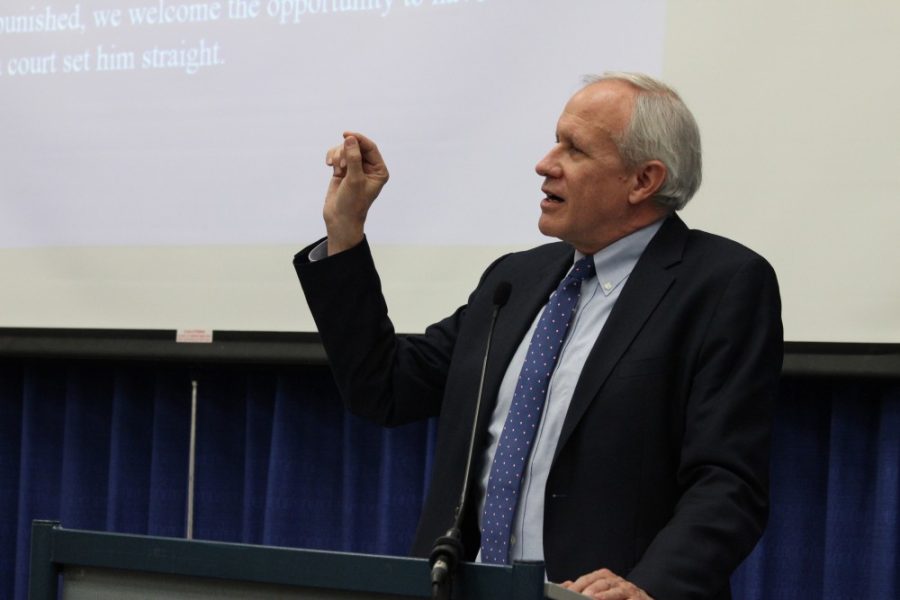David McCraw, the vice president and deputy general counsel for The New York Times, told a story about his encounter with then-presidential candidate Donald Trump involving a certain article about Trump inappropriately touching women.
Before the story even ran, McCraw and his colleauges heard word from the potential president that if the New York Times ran the story he would sue. In response to that claim McCraw wrote and then sent out a letter that went viral.
“I read his letter back in October when he published it,” said Erik Kolsrud a journalism junior. “I was on the fence about law, but I think that letter … convinced me that it’s something I want to do.”
Journalism and law students, as well as community members and faculty, gathered for McCraw’s lecture on Monday, Feb. 13, at the James E. Rogers College of Law. The lecture, “Make Media Law Great Again,” revolved around the ideas and laws surrounding free speech under our new president.
RELATED: Law professors give advice following Trump’s immigration orders
McCraw taught media law at New York University. He said the laws they’re teaching and the cases they’re reviewing come from the ’60s, ’70s and ’80s.
“Donald Trump was talking about my laws, about my cases, about the things I cared about, and it was really quite extraordinary,” McCraw said.
McCraw’s talked about the way Trump and those around him talk about press freedom.
“The headline here is that much of the discussion happening is a lot like teenage boys talking about sex, there is a lot of talk and not so much action,” McCraw said.

To this day, media law remains strong and no serious challenge has changed the way we interpret the first amendment. However, there is one exception that worries McCraw.
“What is under attack is the democratic norms about press-government interaction and the beliefs of the role that they play in society, about the acceptance that truth matters, about valuing a press freedom and freedom of expression, and all of those things are under attack,” McCraw said.
McCraw displayed screenshots of Trump’s tweets in regards to the article and the letter McCraw wrote. He read aloud what he had told the Washington Post about Trump wanting to open up our libel laws.
McCraw explained the simple answer to this debacle is Supreme Court case New York Times v. Sullivan, which has been law since 1964. If a publication writes about public figures, only reckless disregard for the truth can keep them from defending a libel suit. How and if Trump wants to go about changing those laws is unclear.
RELATED: UA speaker details changes in gay rights through history
“I’ve worked in network television, and from this lecture I learned the law on specific regulations and cases, which pertains to the controversial nature of information coming out from the government and how it’s a hot-button issue right now,” said Sarah Farid a third-year law student.
Fake news has become Trump’s mantra that he recites in his tweets, McCraw said—from the president claiming that he never owned a bathrobe to insisting any negative polls are fake news. The real concern with fake news are those who intentionally create and propagate it on the internet, knowing it’s not true.
McCraw said whether you are a conservative or liberal or wherever you are on the spectrum, the concern should be on how the internet has changed things and how some of the things going on are in the name of free expression, whether that is fake news or hate speech.
He said these are serious problems: hate speech, fake news, cyberbullying, a government that is too secretive. McCraw said we should be having a national discussion on how are we supposed to draw the lines in regards to fake news, free speech, the internet and government transparency in today’s world.

“I don’t think Trump is going to be able to go up against 50 years of jurist prudence that have helped create robust press freedoms in this country,” said Isaac Rounseville, a journalism and philosophy, politics, economics and law junior. “I think that journalists and the press are going to play a very strong role in the next four years of Trump’s presidency.”
McCraw didn’t have an answer to all those questions but what he is certain about is that it has to be a discussion that can’t be had in 140 characters or less. He did, however, have advice for future journalists going into today’s environment of media law:
“Do what they’ve always done, which is pursue stories fearlessly, check the facts, be fair but not be intimidated,” he said. “I still believe in old-fashioned reporting, and no matter how much criticism you get, in the end the readers and viewers really care about the truth and they’ll find it.”
Follow David Pujol on Twitter.









